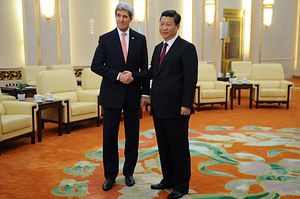Recent tensions over cyber espionage and the South China Sea have brought out areas of disagreement in U.S.-China relations. And yet, even as the U.S. and China trade barbs over these issues, they are stepping up their cooperation on a problem of global significance: climate change.
U.S.-China cooperation on climate change isn’t new. Just after his election in 2008, Barack Obama promised that his administration would being a “new chapter in American leadership on climate change.” And to deal effectively with climate change, Obama would have to seek close cooperation from China, which had become the world’s biggest emitter of carbon dioxide by 2007. Back in 2009, when Hillary Clinton traveled to China for her first visit as secretary of state, she listed “global climate change” as the second item on her agenda, right after the global economic crisis. Likewise, cooperation on climate change was high on Obama’s priority list during his state visit to China in 2009.
However, this cooperation fizzled out after the disappointment of the 2009 Climate Change Conference in Copenhagen. There, it became clear that China was not willing to commit to definitive emissions cuts. Instead, Beijing held fast to the idea of “common but differentiated responsibilities” enshrined in the Kyoto Protocol, which demanded developed countries take on the lion’s share of the responsibility (both technical and financial) for combating climate change.
Copenhagen left a sour taste in the mouths of both China and the U.S. The U.S. was frustrated that it had received so little cooperation from China on an issue that was clearly a top priority for Obama. Beijing, meanwhile, felt that it had been falsely blamed for the issues at the Copenhagen Conference, particularly as there was no guarantee Obama would ever be able to get ambitious climate change legislation through Congress. For the next few years, climate change mostly disappeared from high-profile U.S.-China talks, although cooperation on clean energy technology continued behind the scenes.
Much has changed in the last few years, however. A growing awareness of China’s environmental issues has made environmental protection one of the top priorities for Xi Jinping and Li Keqiang. China has declared a “war on pollution,” and is beginning the legislative reforms required to back this up (including reforms that will give the Ministry of Environmental Protection more power). China is stepping up its already substantial investments in clean energy and testing out a carbon trading program for many of its large urban areas.
In the U.S., climate change is also reemerging as a priority for Obama. The White House recently released a report detailing the dangers of climate change, including not only increased temperatures but also an increase in extreme weather patterns in general. The government has stepped up efforts to link climate change with national security, citing negative climate effects as a contributor to terrorism and other violent activities. Accordingly, climate change is back on the agenda for U.S.-China relations. Other than the vague promise to build a new type of great power relationship, one of the major deliverables of last summer’s Sunnylands Summit was a commitment for both countries to reduce the consumption and production of hydrofluorocarbons (HFCs). In February, climate change was John Kerry’s second priority in his visit to Beijing.
The question, then, is whether the U.S. and China can link their domestic initiatives to create synergy for bilateral cooperation on this issue. Certainly having each side invested for its own reasons will boost the potential for meaningful action. As Xi Jinping told Kerry back in February, China’s commitment to fighting climate change is motivated “not [by] others’ demand but our own will.” If both the U.S. and China can bring significant political will to bear on this issue, cooperation will be much easier.
Ironically, despite years of pressure from Obama to get China’s cooperation, real progress may be harder for the U.S. According to a recent poll, the U.S. public is not convinced climate change is even an issue — nearly 40 percent of Americans do not believe that global temperatures are rising due to emissions of greenhouse gases. Meanwhile, legislation curbing emissions would face stiff political opposition from Republicans in Congress, many of whom see such moves as economic suicide.
In China, however, the public is highly concerned about environmental problems in general and is likely to embrace moves to cut down on emissions. There will certainly be political opposition from vested interest groups in Beijing, but should Xi prove truly determined to combat the problem, he can do so. In China, the most likely problem will be implementation of new environmental standards rather than the actual passage of new laws.
The test for U.S.-China cooperation on climate change is rapidly approaching. Both sides have committed “to contribute significantly” to the 2015 Climate Change Conference, to be held in Paris. The plan is for a replacement to the Kyoto Protocol to be adopted in 2015 and to take effect in 2020. Whether or not the Paris conference reaches this lofty goal will be heavily dependent on whether the U.S. and China can come to an agreement on emissions reductions.

































